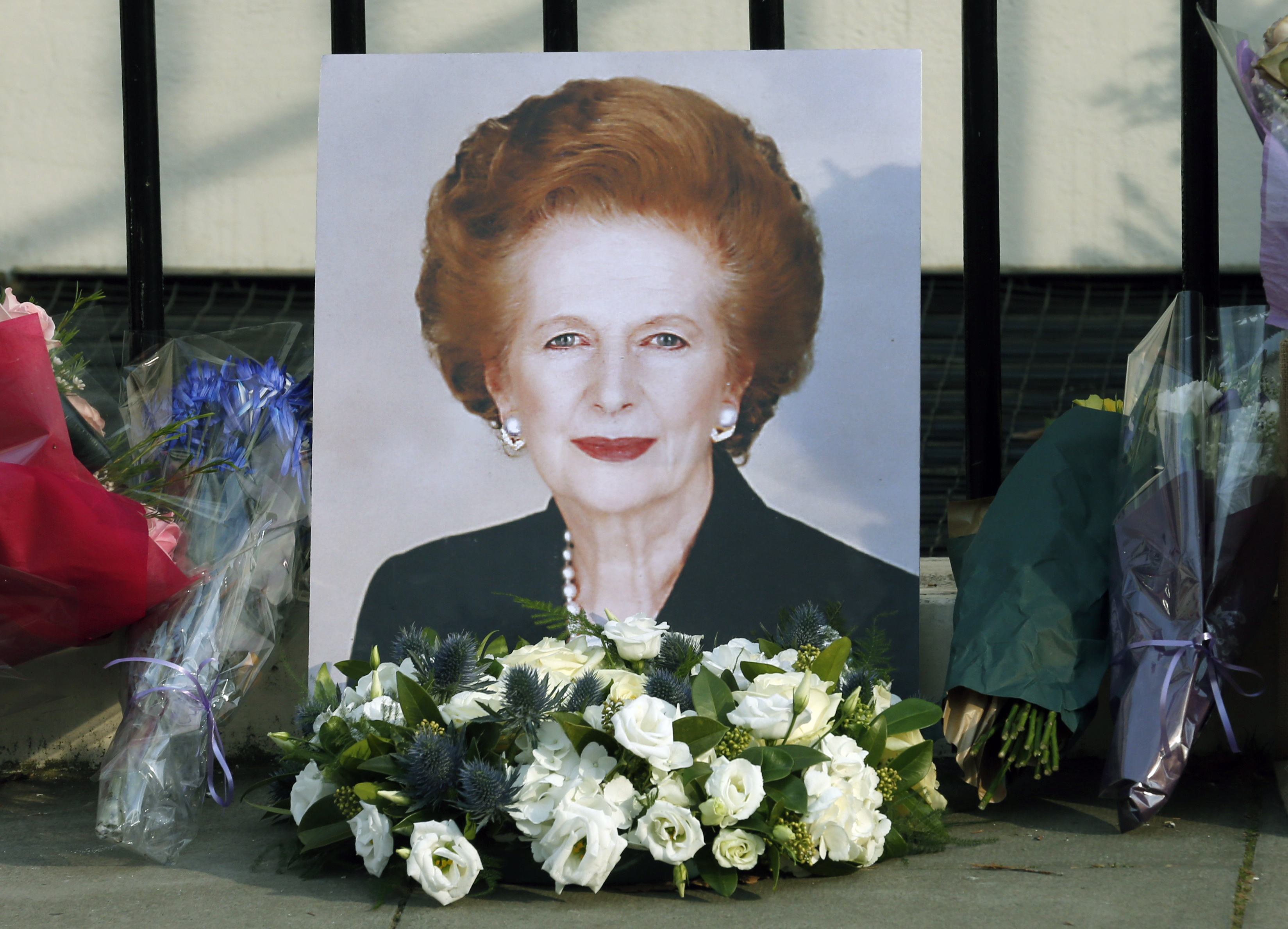Papers call Thatcher a “nanny” and a “superstar”

Prime Minister Margaret Thatcher ruled Britain with a firm hand and a sturdy handbag, recall Swiss newspapers the morning after her death at the age of 87. Her legacy continues to affect the state of the British economy and society, say analysts.
“The memory of the shopkeeper’s daughter with the handbag and the hot-roller hairdo is either an inspirational beacon or an irritating monument to be compared to – especially by political rivals, and seldom with flattering results,” writes the Neue Zürcher Zeitung (NZZ).
Nor could the Tages-Anzeiger resist a reference to Thatcher’s key accessory. The cartoon on its front page shows her at heaven’s gate armed with a structured red bag; Saint Peter is pointing at it and saying, “Sorry! No weapons!”
Fashion aside, it was Thatcher’s style of leadership that was the focus of media commentary on Tuesday.
“She started the conservative renaissance of the post-war period and became a legend – loved, hated, but above all, respected,” as tabloid Blick sums it up. Thatcher served as prime minister of Britain from 1979 until 1990. She died of a stroke in London on April 8.
Margaret Thatcher made only one official visit to Switzerland, in September 1990, to discuss the issue of European integration, in particular.
She was the first British PM to pay a state visit to Bern.
Trained as a chemist, Thatcher was interested in the Swiss pharmaceutical industry and made a stop at Ciba-Geigy in Basel, which later merged with Sandoz and became Novartis.
In November 1990, Thatcher was in Switzerland again – this time to participate in the second global climate conference in Geneva, where she called for immediate action to stabilise CO2 emissions.
Thatcherism
Few people have a political ideology named after them. According to the Südostschweiz newspaper, Thatcherism stands for deregulation, privatisation and the destruction of the welfare state as well as a feeling of community.
“No one divided British society like Thatcher did. She was responsible for the destruction of the unions and the ruin of the public sector, in particular the National Health Service,” according to Südostschweiz.
Freiburg newspaper La Liberté also refers to Thatcher’s method of “shock therapy” and the problems it caused.
“Along with Ronald Reagan in the USA, she was the best student of the Milton Friedman school in Chicago – in the service of the ‘conservative revolution’,” states La Liberté.
“Superstar” and “demigoddess”
The NZZ cited the victory in 1982’s Falkland War as Thatcher’s “greatest triumph. This enabled her re-election despite the economic crisis.”
“Stubbornness and assertiveness wouldn’t have saved Thatcher. It took the help of the Argentinian generals: the successful war in the Falkland Islands turned Thatcher into a superstar,” says the Tages-Anzeiger.
The newspaper went on to say that “her economic policy and her resolute manner made her a demigoddess among the followers of Friedrich von Hayek and Milton Friedman”.
However, Thatcher’s dealings with the Falkland Islands may have spawned more violence, suggests the NZZ. “Some commentators believe that Thatcher’s success inspired war campaigns from Iraq to Libya.”
Symbol of neoliberalism
According to the Tages-Anzeiger, Thatcher’s biggest economic success was the “Big Bang” – the abrupt deregulation of the banking industry.
“As prime minister, she whipped the ailing British economy back into shape. But the people had to pay a high price for it,” points out the Tages-Anzeiger. When she resigned, nearly seven million Brits were on the dole – 60 per cent more than when she took office in 1979.
In addition, the Zurich-based newspaper says, “Infrastructure was crumbling, the re-privatised railway was a debacle and crime was on the rise” when Thatcher vacated Downing Street.
“Along with Wall Street, the city of London became the most significant financial centre. Today, this blessing is becoming a curse. Because of its huge dependence on the banks, the crisis is hitting the British economy especially hard,” continues the newspaper. “The fact that David Cameron is now drawing on the Iron Lady’s neoliberal recipe is downright devastating.”
The NZZ also cites one of the worst aspects of the Thatcher legacy.
“Two decades after her resignation … the inequality in terms of income and opportunities in Britain is greater than on the European continent.”

In compliance with the JTI standards
More: SWI swissinfo.ch certified by the Journalism Trust Initiative




You can find an overview of ongoing debates with our journalists here. Please join us!
If you want to start a conversation about a topic raised in this article or want to report factual errors, email us at english@swissinfo.ch.